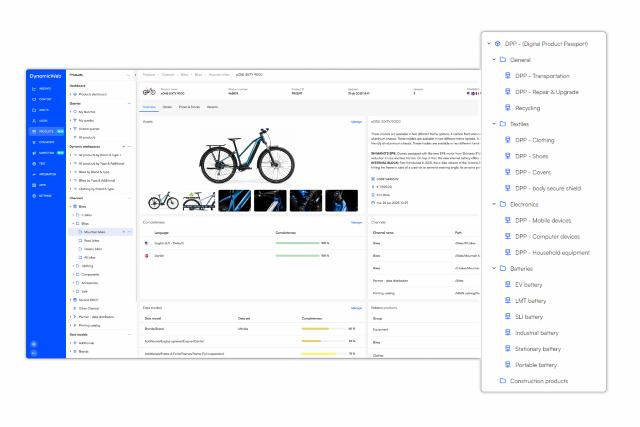Insights
Digital Product Passport
Are you ready for the Digital Product Passport? If the answer is no, it might be time to start the conversation and find the right solution for you and your business.
Curious to learn more? Check out our new DPP Short Series videos and make sure to download our white paper to learn how DynamicWeb can help you get your product data in order and get you on track with the Digital Product Passport.
DPP Short Series
What is the DPP and why you need to get started.
Join us as we explore the Digital Product Passport in depth together with Senior Commerce Consultant, Lars Bruun from Columbus Global and Commercial Product Manager, Lars Byg Holm from DynamicWeb.
The DPP Short Series features a series of videos that allows you to dive into the different aspects of the Digital Product Passport - terms, strategies and specific tools to solve the task ahead.
Check it out and make sure to reach out if you are ready to take the next step.
DPP Short Series - shortcuts

Digital Product Passport
What is the Digital Product Passport and what does it mean for your business?
In short, the Digital Product Passport will be a tool to provide detailed information about a product throughout its lifecycle. This information will include data on the product’s composition, origin, environmental impact, and other relevant details. All of which will be available to anyone who interact with the product through a scannable tag (e.g. QR code or similar)
The DPP will make it easier to publish important product information, providing more transparency and traceability in the supply chain and empower consumers to easily compare products and make more informed decisions regarding purchasing, repairing, and recycling products, and make it easier for authorities to verify compliance with legal obligations.
The new level of transparency will motivate brands and manufacturers doing business within the European Union to source, manufacture and distribute more sustainable products to remain competitive.
If you want to learn more, download our Digital Product Passport white paper to read our insights.
Download white paper
Digital Product Passport
What is the Digital Product Passport and what does the initiative mean for your business.
The Digital Product Passport is introduced by the European Union (EU) as a new sustainability regulation with the objective to accelerate the transition to a circular economy, boosting material and energy efficiency, extending products lifetimes, and optimizing products design, manufacturing, use and end of life handling.
The white paper discusses the potential challenges and opportunities for businesses and highlights the role of DynamicWeb PIM in helping companies comply with the Digital Product Passport requirements.
The Digital Product Passport, or DPP for short, is introduced by the European Union (EU) as a new sustainability regulation with the objective to accelerate the transition to a circular economy, boosting material and energy efficiency.
Digital Product Passport
It's all about data!
The Digital Product Passport will set new standards as to how brands and manufacturers maintain the quality and consistency of their product data. DPP data will most likely include:
Product data
Information like name, make, model, batch number, manufacturing date, and warranty details.
Materials data
Information related to origins of raw materials and components.
Supplier data
Information on the suppliers involved in sourcing.
Ownership data
Details on current and past owners.
Repair data
Information about the overall repairability of the product, plus specific repair events and reasons.
Environmental impact data
Information regarding the carbon footprint of the manufacturing and distribution processes, as well as environmental impact throughout its lifetime.
Impact
Potential challenges and opportunities
It will rest upon the brands and manufacturers to collect, provide, and share the required data and there is no doubt that the comprehensive data requirements in the DPP will pose challenges for many actors in the supply chain.
It will first and foremost require companies to have a much deeper understanding of the overall impact of their products. Secondly, it will require companies to implement new strategies, processes, and systems to handle the data requirements, which may require significant investments.
However, the Digital Product Passport will also provide an all-new platform with new opportunities for businesses to position their brand as a serious and responsible partner with a sustainable business model - increasing consumer trust, brand image and competitiveness.
Part of the solution
DynamicWeb PIM and the Digital Product Passport
A Product Information Management (PIM) system can play a crucial role in helping companies comply with the new Digital Product Passport (DPP) requirements and ensure the correct data is always available and up-to-date, safely stored and effectively distributed.
DynamicWeb offers a flexible and scalable Product Information Management (PIM) system that enables companies to easily collect data from different sources, including ERP systems, third-party data pools, partner feeds etc.


More insights
Want to learn more about PIM?
What is a PIM system, why do you need one and how can DynamicWeb PIM fit into your business?
Delve into the depths of our PIM-Guide to get the answers and discover best practices and industry insights.







